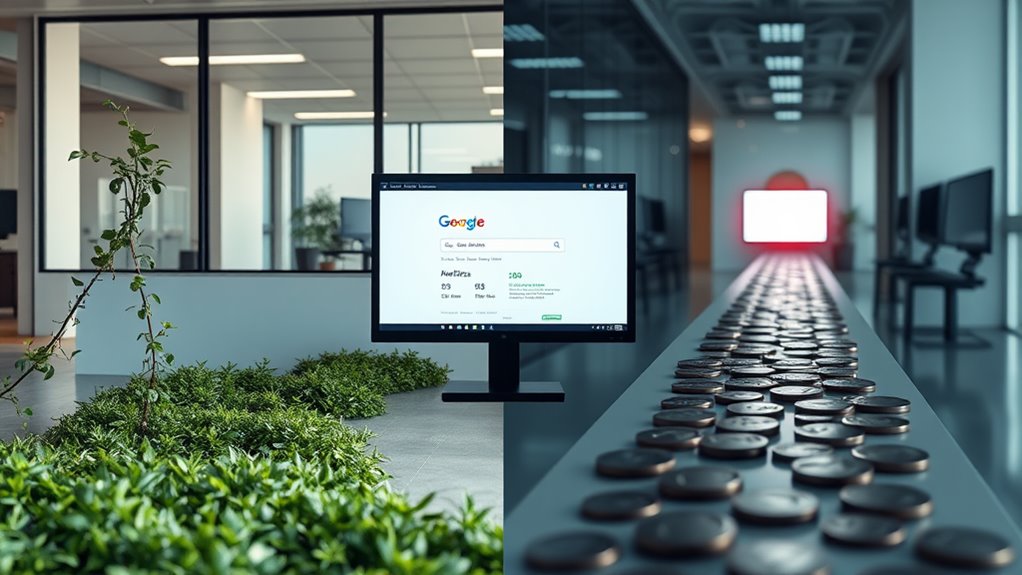SEO isn't a one-time task but an ongoing process that requires regular attention and updates. You'll need to maintain your strategy consistently since Google makes over 500 algorithm changes annually, and your competitors are constantly evolving their approaches. Your website's SEO health depends on fresh content, technical maintenance, and adaptation to new search engine requirements like mobile-first indexing and Core Web Essentials. Regular monitoring of metrics, including traffic patterns and keyword rankings, helps identify necessary adjustments before problems escalate. With search engines becoming increasingly sophisticated, your SEO strategy must evolve to maintain and improve your rankings. Let's explore the key components of a sustainable SEO approach.
Key Takeaway
- SEO requires ongoing maintenance as Google makes over 500 algorithm changes annually, affecting how websites rank in search results.
- Regular content updates are essential because outdated information leads to declining rankings and reduced organic traffic.
- Technical SEO needs continuous monitoring to address broken links, page speed issues, and mobile optimization requirements.
- Competitor strategies and market trends constantly evolve, requiring regular analysis and strategic adjustments to maintain rankings.
- Monthly performance tracking and updates are necessary to identify and fix issues before they cause significant ranking drops.
The Ever-Changing Search Landscape
Search engines constantly evolve their algorithms and ranking factors to deliver better results to users. When you consider Google's history, you'll find they make hundreds of updates yearly, with major core updates occurring several times annually.
Key Algorithm Changes You Need to Know:
- Mobile-first indexing now prioritizes your site's mobile version
- Core Web Essentials measure your page's loading speed, stability, and interactivity
- BERT and MUM updates enhance search engines' understanding of natural language
- E-A-T principles evaluate your content's expertise, authoritativeness, and trustworthiness
You'll notice these changes directly impact your website's visibility and rankings. For instance, if you haven't optimized your site for mobile devices, you're likely seeing decreased traffic since Google's mobile-first implementation.
Future-Proofing Your SEO Strategy:
- Monitor Google's official announcements for upcoming changes
- Regularly audit your website's technical performance
- Update your content to match current search intent
- Adapt your strategy based on analytics data
You can't treat SEO as static because search engines won't stop evolving. Your approach must remain dynamic, responding to new requirements while maintaining core optimization principles.
Why Regular SEO Updates Matter
Regular maintenance of your SEO strategy isn't just recommended—it's crucial for maintaining and improving your search rankings. Search engines continuously update their algorithms, with Google alone making over 500 changes annually to its ranking factors and evaluation methods.
Your SEO efforts require consistent attention in these key areas:
- Content Freshness: You'll need to update your existing content and create new material that addresses current search intent, as outdated content can drop considerably in rankings.
- Technical Updates: Search engines regularly introduce new technical requirements, from mobile-first indexing to Core Web Vitals, which you must implement to maintain visibility.
- Competitive Analysis: Your competitors are likely adjusting their strategies, and you'll need to monitor and adapt to maintain your market position.
- User Behavior Tracking: Search patterns evolve with new technologies and trends, requiring you to adjust your keyword strategy and content approach.
Common SEO Maintenance Mistakes

Key Maintenance Errors to Watch For:
- Neglecting to update content regularly, leaving your site with stale, outdated information
- Failing to monitor and fix broken links, which can affect user experience and crawlability
- Ignoring mobile optimization, despite 60% of searches now occurring on mobile devices
- Overlooking technical SEO issues like slow page load times and improper redirects
Additional Critical Mistakes:
- Not tracking your competitors' SEO strategies and keyword changes
- Focusing solely on rankings while ignoring conversion rates
- Forgetting to optimize new content for featured snippets
- Neglecting to update meta descriptions and title tags as services evolve
To maintain effective SEO, you'll need to implement a systematic approach to monitoring and updating these elements. Create a monthly maintenance checklist that includes reviewing analytics, updating content, and checking technical performance metrics. Remember, search engines value websites that demonstrate consistent maintenance and improvement over those that remain static.
Signs Your SEO Needs Attention
Identifying when your SEO strategy needs a refresh isn't always obvious, but several telltale signs can alert you to potential problems. Your analytics data holds essential indicators that shouldn't be ignored.
Key Warning Signs to Monitor:
- Traffic decline of 15% or more over three consecutive months
- Significant drop in your keyword rankings for primary search terms
- Bounce rates exceeding 65% on key landing pages
- Conversion rates falling below your industry's benchmark
- Core Web Vitals scores dropping into the "poor" range
Technical Red Flags:
- Increasing number of 404 errors in Search Console
- Mobile usability issues affecting more than 10% of pages
- Declining crawl rates from search engine bots
- XML sitemap errors or outdated content maps
- Security warnings or SSL certificate issues
You'll also want to watch for competitive shifts, such as competitors outranking you for previously dominated keywords or new market entrants gaining visibility. If you're experiencing three or more of these indicators simultaneously, it's time to conduct an extensive SEO audit and update your strategy accordingly.
Creating a Sustainable SEO Strategy

Building a sustainable SEO strategy requires a systematic approach that evolves with search engine algorithms and user behavior patterns. You'll need to establish a foundation that can adapt to changes while maintaining consistent performance over time.
Key Components of a Sustainable Strategy:
- Content Calendar Planning: Map out your content creation schedule quarterly, ensuring regular updates and fresh material for search engines to index
- Performance Monitoring System: Set up analytics tracking to measure key metrics like organic traffic, bounce rates, and conversion rates
- Competitor Analysis Schedule: Conduct monthly reviews of your competitors' keyword strategies and content approaches
- Technical Health Checks: Implement monthly website audits to identify and fix crawl errors, broken links, and page speed issues
To maintain sustainability, you'll want to:
- Allocate 20% of your SEO budget for testing new approaches
- Update existing content every 3-6 months
- Track algorithm updates and adjust strategies accordingly
- Build a diverse backlink portfolio through varied outreach methods
Remember to document your processes and create standard operating procedures that your team can follow, ensuring consistency even when personnel changes occur. This systematic approach will help you maintain rankings while adapting to search engine evolution.
Tools for Ongoing SEO Success
Success in modern SEO relies heavily upon the right combination of tools and software that can streamline your optimization efforts. Today's digital landscape demands a thorough toolkit that helps you track, analyze, and improve your website's performance across multiple metrics.
To maintain competitive advantage, you'll need both free and premium tools that cover different aspects of SEO management. Google's suite of tools, including Search Console and Analytics, provides your foundation, while specialized platforms offer deeper insights into specific optimization areas.
Essential SEO tools for ongoing success include:
- SEMrush or Ahrefs for thorough keyword research and competitor analysis
- Screaming Frog for technical SEO audits and crawl data interpretation
- Moz Pro for tracking domain authority and backlink profiles
- Google Search Console for monitoring search performance and indexing issues
- Yoast SEO for on-page optimization guidance in WordPress environments
When selecting your tools, focus on those that provide real-time data monitoring, actionable insights, and integration capabilities with your existing systems. You'll want to establish a regular schedule for reviewing metrics and implementing adjustments based on the data these tools provide, ensuring your SEO strategy remains effective and current.
Conclusion
SEO isn't a set-it-and-forget-it solution, but rather an ongoing journey that demands your attention, adaptation, and commitment. Just as your business evolves, so too must your SEO strategy shift and grow with changing algorithms, user behaviors, and market dynamics. By maintaining a proactive approach, regularly monitoring your performance, and staying current with industry trends, you'll position yourself for sustainable search visibility and continued digital success.









